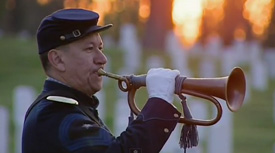House Proposes Taps Made National Song of Remembrance
Daily News Article — Posted on June 8, 2012
 (by Richard Simon, ChicagoTribune.com) WASHINGTON — A House-approved defense bill deals with Pentagon spending, weapons systems — and taps, the bugle call sounded at funerals.
(by Richard Simon, ChicagoTribune.com) WASHINGTON — A House-approved defense bill deals with Pentagon spending, weapons systems — and taps, the bugle call sounded at funerals.
The little-noticed provision calls for designating taps the National Song of Remembrance and establishes recommended conduct during its sounding.
The measure comes on this year’s 150th anniversary of the bugle call’s composition, marked recently by 200 buglers playing it at Arlington National Cemetery. The anniversary also will be marked by ceremonies this month at Berkeley Plantation in Virginia, where Union Army Gen. Daniel Butterfield and bugler Oliver Willcox Norton composed taps in 1862.
Supporters of the provision note that the nation has a national floral emblem (the rose), national tree (the oak) and national march (John Philip Sousa’s “The Stars and Stripes Forever”). And legislation has been introduced to designate the bison the national mammal.
“We’re trying to get a national song of remembrance,’’ said Jari Villanueva, a retired Arlington Cemetery military bugler who heads Taps 150, an organization set up to commemorate the 150th anniversary.
The provision, which expresses the sense of Congress that taps be designated as the national song of remembrance, was sought by Rep. Tom Reed (R-N.Y.) after a retired military bugler from his district approached him with the idea.
 Villanueva, a member of Buglers Hall of Fame from Baltimore, said that while the federal code defines conduct during playing of the National Anthem, it is silent on conduct during sounding of taps.
Villanueva, a member of Buglers Hall of Fame from Baltimore, said that while the federal code defines conduct during playing of the National Anthem, it is silent on conduct during sounding of taps.
The recommended conduct during sounding of taps, written into the defense bill, says: “All present, except persons in uniform, should stand at attention with the right hand over the heart; men not in uniform should remove their headdress with their right hand and hold the headdress at the left shoulder, the hand being over the heart; and persons in uniform should stand at attention and give the military salute at the first note of Taps and maintain that position until the last note.’’
The legislation provides for an exception when taps is sounded as the final bugle call of the day at a military base.
Previous efforts have been made to designate taps the national song of remembrance. Then Rep. John Hall (D-N.Y.), a musician who introduced legislation in the last Congress, called taps “one of the most recognized pieces of music in America.’’
Prospects for the defense bill are uncertain.
But when it comes to taps, Congress has, uh, taken note.
[Read HR 595 at the Library of Congress’ website Thomas, which gives information on all bills: thomas.loc.gov/home/thomas.php
NOTE: Click on search by bill number, then type in hr595]
Reprinted here for educational purposes only. May not be reproduced on other websites without permission from ChicagoTribune.com.
Background
As soon as Taps was sounded that night in July 1862, words were put with the music. The first were, “Go To Sleep, Go to Sleep.” As the years went on many more versions were created. There are no official words to the music but here are some of the more popular verses: (from tapsbugler.com)
Day is done, gone the sun,
From the lake, from the hill,
From the sky.
All is well, safely rest,
God is nigh.
Fades the light; And afar
Goeth day, And the stars
Shineth bright,
Fare thee well; Day has gone,
Night is on.
Thanks and praise, For our days,
‘Neath the sun, Neath the stars,
‘Neath the sky,
As we go, This we know,
God is nigh.
